Key takeaways:
- Effective follow-ups enhance participant engagement and foster lasting connections after workshops.
- Personalized communication, timely outreach, and thoughtful prompts can significantly improve responses and collaboration opportunities.
- Utilizing tools like CRM systems and project management platforms helps track interactions and maintain a structured follow-up schedule.
- Creating a collaborative community and sharing tailored resources enrich participants’ experiences and support their artistic journeys.
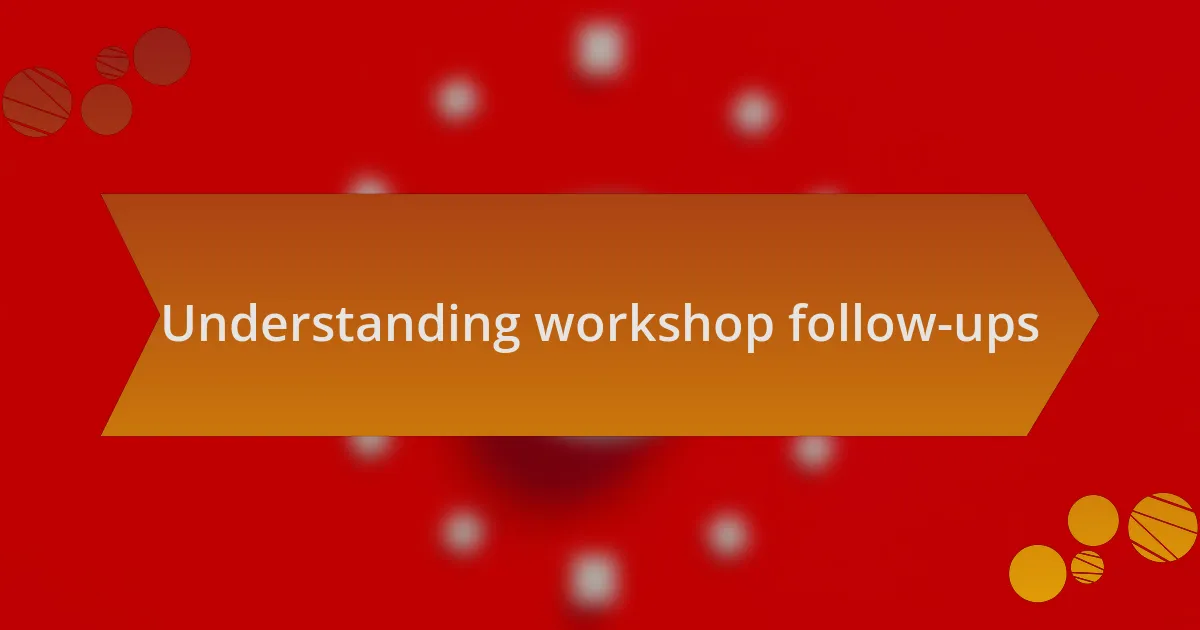
Understanding workshop follow-ups
Workshops can be incredibly energizing, but the real magic often happens afterward. I’ve hosted sessions where the excitement fizzled out within days. When I implemented follow-ups, I noticed participants feeling more connected and engaged. This made me realize that a simple email or a phone call can bridge the gap between inspiration and action.
One key aspect of follow-ups is tailored communication. In my experience, acknowledging individual contributions from workshop attendees fosters a sense of belonging. I remember once reaching out to a participant who had expressed doubt during the session. After a thoughtful follow-up, they shared not only their progress but also their renewed enthusiasm, which was genuinely heartwarming.
As I reflect on my own journey, I can’t help but wonder: how many potential masterpieces might be lost due to a lack of follow-up? Engaging with participants after a workshop can be a game-changer, turning fleeting interest into sustained passion. Ensuring these connections deepen enriches not just the individual’s journey but also the broader artistic community.
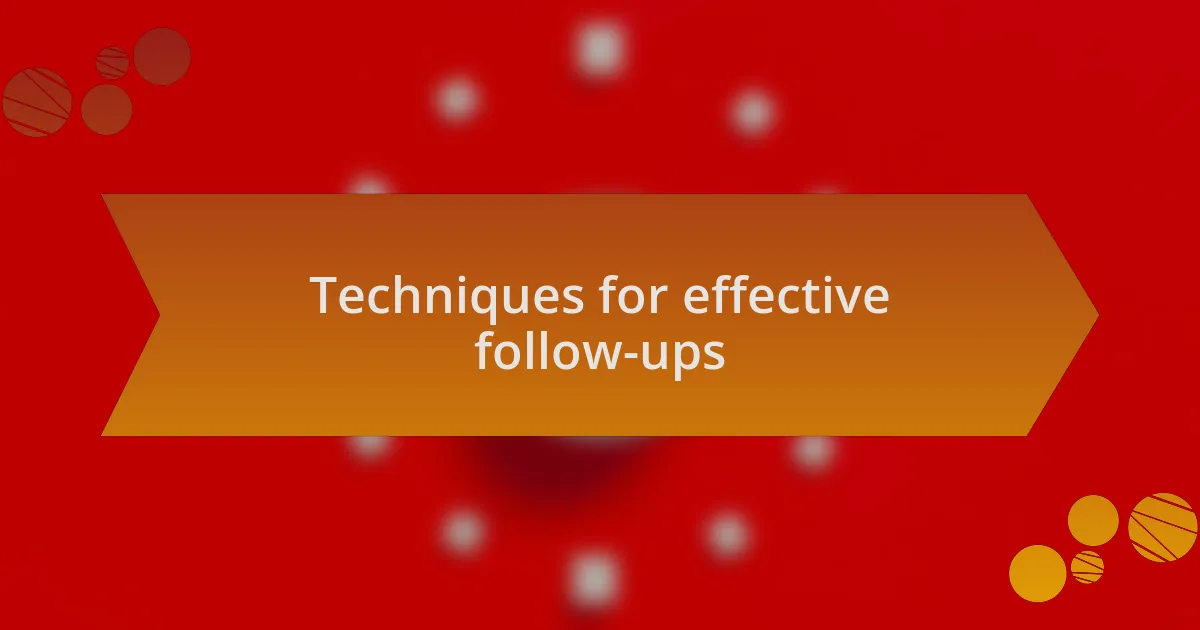
Techniques for effective follow-ups
One technique I’ve found effective is creating a personalized follow-up message. Instead of a generic thank-you email, I include details about what resonated with each participant. For instance, I once mentioned a specific project idea from a participant during my follow-up, which led to a vibrant discussion about their creative journey and even collaboration opportunities. It’s amazing how small, thoughtful gestures can spark deeper connections.
I also strongly believe in the power of prompts in follow-up communications. Asking participants about their goals or challenges post-workshop can open doors to meaningful dialogue. I remember integrating this approach once and received a heartfelt response from a participant who felt lost after the workshop. They indicated that the prompt had inspired them to set a clear path forward, and that engagement truly brightened my day.
Moreover, timing is crucial when it comes to follow-ups. I’ve experimented with sending my messages within a week of the workshop to maintain momentum. There was that one time I waited too long, and the excitement had waned significantly. This experience taught me that capturing the enthusiasm while it’s still fresh is essential for nurturing a lasting relationship. How might your own follow-up timing impact the connections you form?
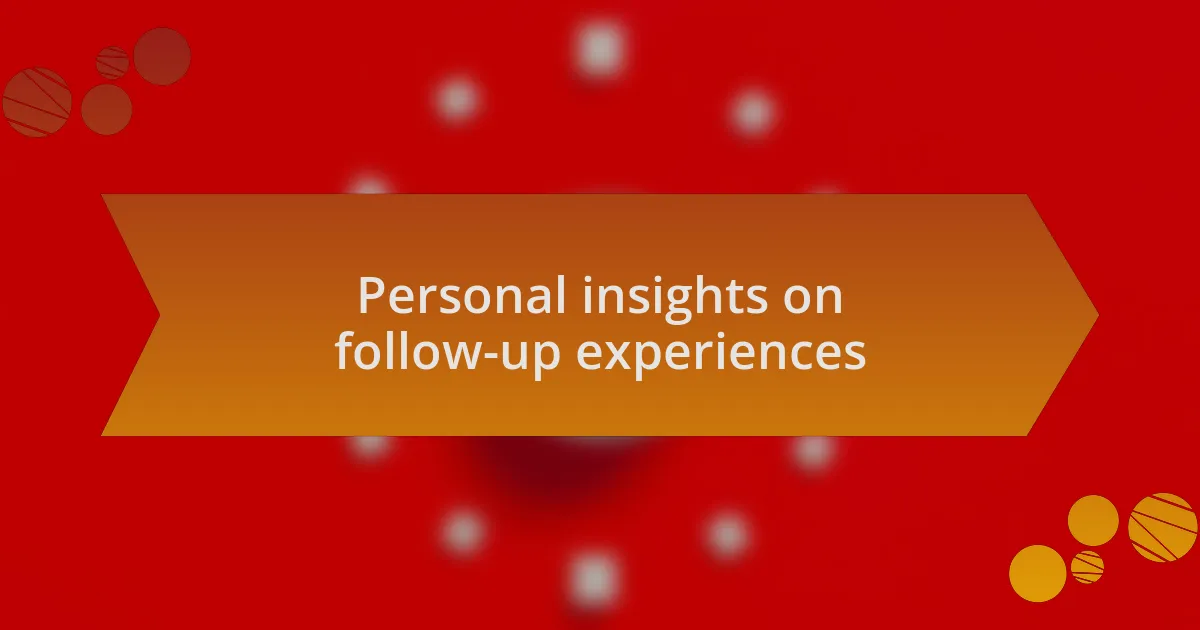
Personal insights on follow-up experiences
When reflecting on my follow-up experiences, I often realize how pivotal the initial interaction can be in shaping future conversations. A few months ago, I followed up with a participant who had shared a deeply personal story during the workshop. I made it a point to reference that moment in my email, which prompted them to share even more about their artistic journey. It was a powerful reminder that acknowledging someone’s vulnerability can foster a deeper connection.
I’ve also discovered that the method of follow-up can greatly influence the response. One time, I opted to send a short video message instead of a traditional email. The participant responded with excitement, mentioning how my effort made them feel valued and heard. Isn’t it fascinating how a simple change in format can elevate engagement? Personal touches like this can make all the difference in how we nurture those professional relationships.
While I often stress the importance of timing, I’ve learned that following up with a sense of humor can also be effective. I once reached out to a participant a week post-workshop, playfully referencing a light-hearted moment we shared. Their reply was filled with laughter and gratitude, opening the door for an engaging conversation about our shared experiences. This experience taught me that humor can transcend formality, allowing for a more genuine connection. How could a light-hearted approach transform your own follow-up strategies?
![]()
Best tools for tracking follow-ups
When it comes to tracking follow-ups, I’ve found that CRM (Customer Relationship Management) tools can be invaluable. Using a platform like HubSpot not only helps me keep track of interactions but also provides reminders for future correspondence. Once, I was able to quickly refer back to notes from a previous follow-up, which allowed me to personalize my message, making the recipient feel valued and remembered.
Another tool that has worked wonders for my follow-up processes is Trello. I create boards dedicated to different workshops, allowing me to track who I’ve contacted and what their responses are. It feels rewarding to move cards from “Pending” to “Completed.” This visual representation keeps tasks manageable and gives me a sense of accomplishment, don’t you think that clarity can replace chaos in organization?
Lastly, I’ve come across platforms like Mailchimp for email follow-ups. Segmenting my audience based on their interests and feedback has enhanced engagement significantly; I remember customizing an email blast that featured artwork similar to what a participant had previously mentioned. The positive response was overwhelming. Isn’t it amazing how targeted communication can spark a deeper connection?
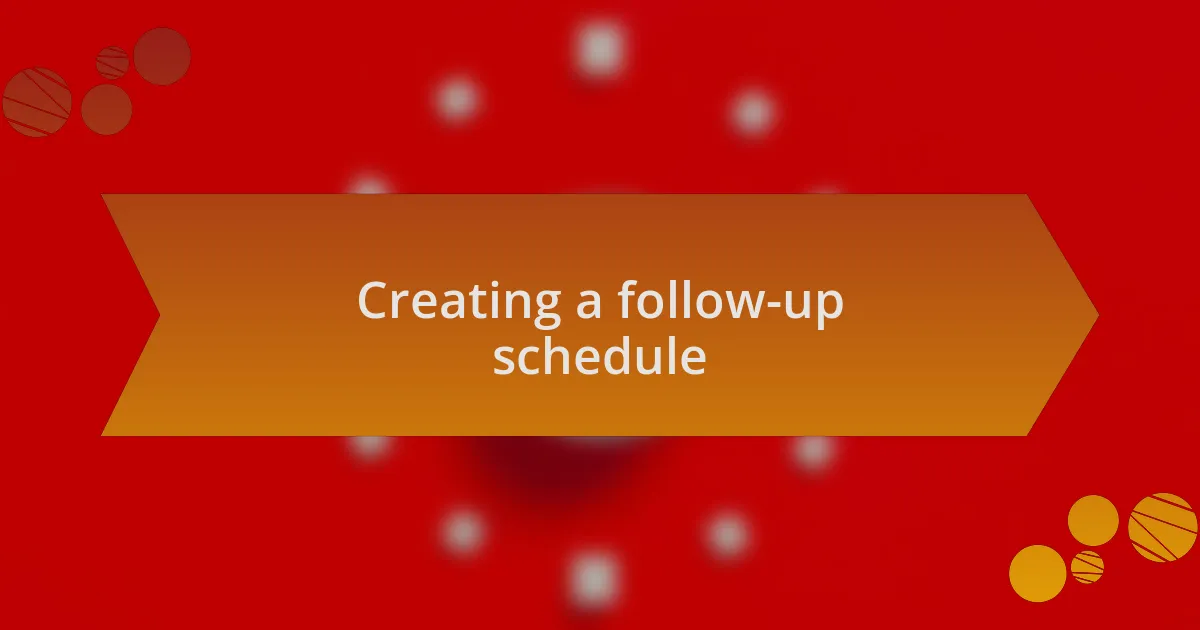
Creating a follow-up schedule
Creating a follow-up schedule is crucial for maintaining engagement with participants after a workshop. I like to set specific dates in my calendar for follow-ups based on the feedback I received during the session. This not only ensures that I connect with attendees while the experience is still fresh in their minds, but it also demonstrates that I value their input.
One technique I’ve found particularly effective is to customize the frequency of my follow-ups depending on the individual. For instance, I once had a participant who was enthusiastic about further discussions. I scheduled weekly check-ins with them, and the relationship blossomed into an exciting collaboration. It made me realize how tailoring my approach can lead to meaningful connections – doesn’t it feel rewarding when someone truly appreciates your effort to reach out?
Lastly, incorporating reminders into my follow-up schedule has been a game-changer. Whether it’s using a simple app on my phone or task reminders through my email, I ensure no one gets overlooked. I recall missing an opportunity once simply because I lost track of time. That moment reminded me the importance of structure, and now I can follow through in a timely manner, ensuring every participant feels acknowledged. How often do we lose track of connections when we lose track of time?
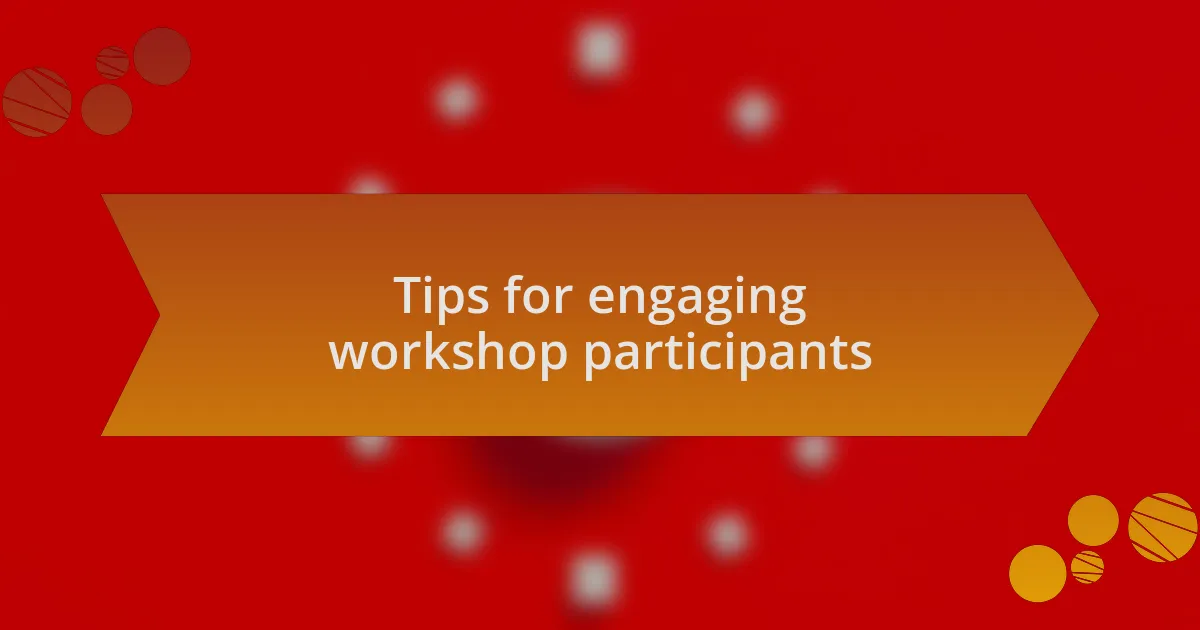
Tips for engaging workshop participants
Engagement doesn’t end when the workshop does; it can often be enhanced through active communication. I make it a point to ask participants for their thoughts on the workshop’s content and how it can be applied to their personal practice. Once, I sent a follow-up email with a question about their favorite moment during the session, and the responses flowed in like a refreshing breeze. This not only kept the conversation alive but also allowed me to build rapport. Isn’t it fascinating how a simple question can deepen connections?
Another technique is to create a collaborative space for participants to share their ideas. I’ve established a private group online where people can post their projects inspired by the workshop. Seeing the creativity of others ignites passion in me too. I often find myself asking, “How can I contribute to their journey?” It’s fulfilling to witness the growth of participants who have taken my workshop, reminding me that fostering a community amplifies engagement and creativity.
Lastly, sharing additional resources based on their interests can significantly strengthen ties. I remember one participant who was curious about modern techniques in painting. After the workshop, I compiled a list of articles and tutorials tailored to her inquiries. When she expressed her gratitude, it was a profound moment for me, reinforcing that I’m not just teaching; I’m nurturing individual artistic journeys. How often do we think about the power of providing value tailored to someone’s passions? It’s a simple yet effective way to keep participants engaged long after the final curtain falls.